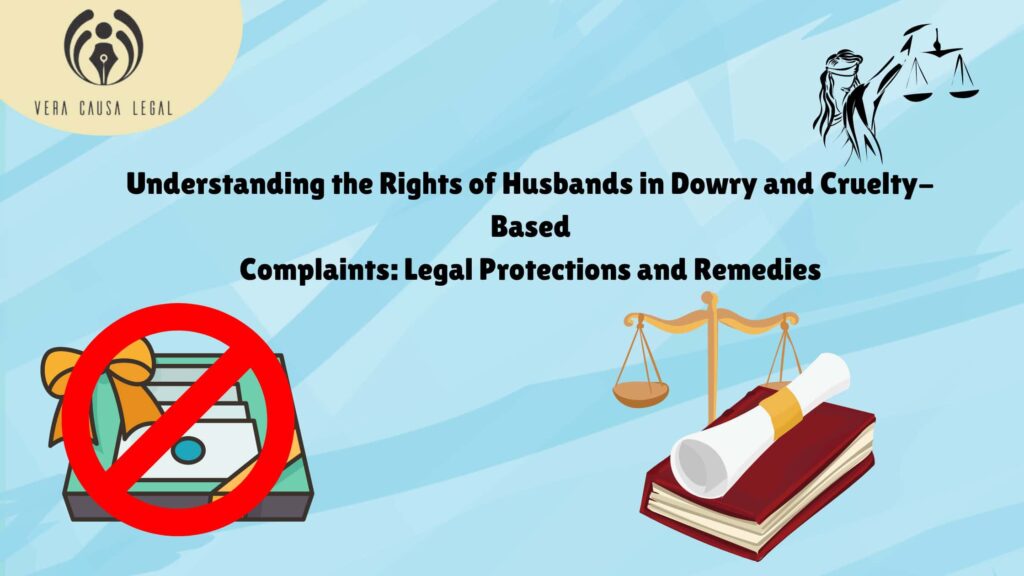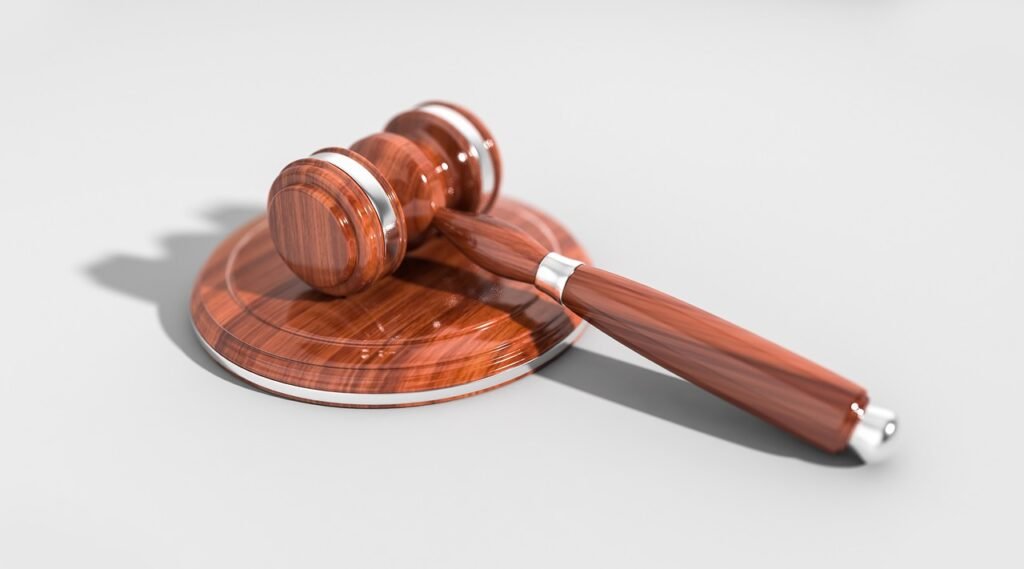The legal landscape surrounding dowry and cruelty-based complaints in India has traditionally focused on protecting women from harassment and violence. However, there has been a growing recognition of the rights of husbands who face false allegations under these laws. Section 498A of the Indian Penal Code (IPC), designed to shield women from cruelty and dowry demands, has, in some instances, been misused, leading to unjust consequences for husbands. This article explores the legal protections and remedies available to husbands, aiming to balance the scales of justice. From understanding the intricacies of anticipatory bail to navigating defensive and offensive legal strategies, this guide provides a comprehensive overview for those seeking to defend their rights and ensure fair treatment under the law. By highlighting key court precedents and offering practical advice, we aim to empower individuals with the knowledge needed to protect themselves against false allegations.
Introduction to Dowry and Cruelty Laws in India
Dowry and cruelty are significant social issues in India, addressed by various legal provisions to protect married women from harassment and violence. The Dowry Prohibition Act and Section 498A of the Indian Penal Code (IPC) are pivotal in safeguarding women’s rights. However, the misuse of these laws has led to false allegations against husbands, causing severe legal, social, and emotional repercussions. These laws are intended to shield women from dowry harassment and domestic violence, but their misuse has become a growing concern, resulting in unjust arrests and family discord. The balance between protecting genuine victims and preventing the misuse of legal provisions remains a complex challenge for the Indian judicial system.
Understanding Section 498A IPC: Protections and Misuse
Section 498A of the Indian Penal Code (IPC) was enacted to address the severe issue of domestic violence and dowry harassment faced by married women. This provision allows women to file complaints against their husbands and in-laws for cruelty and harassment. The law is cognizable, non-bailable, and non-compoundable, meaning that the accused can be arrested without a warrant, and the complaint cannot be withdrawn. However, the misuse of Section 498A has been a growing concern. Some individuals have used this provision as a tool for legal harassment and extortion, leading to unjust arrests and social stigma for innocent husbands and their families. This misuse undermines the law’s original intent to protect genuine victims of domestic violence.
Legal Rights and Remedies for Husbands
Husbands facing false allegations under Section 498A have several legal rights and remedies at their disposal to protect themselves and their families. Understanding these rights is crucial to ensuring a fair legal process.
Defensive Remedies
One of the primary defensive strategies involves recording conversations—including voice, chat, emails, and letters—that could serve as evidence. Such records can demonstrate that the husband neither demanded dowry nor engaged in cruelty. Another key step is to gather evidence proving that the wife left the marital home without a legitimate reason. This evidence can be instrumental in securing anticipatory bail or notice bail from the court. Additionally, filing for Restitution of Conjugal Rights (RCR) can legally obligate the wife to return to the marital home under specified conditions.
Offensive Remedies
Husbands can also adopt offensive legal measures to strengthen their defense. They can file counter-cases under various sections of the IPC, such as Section 120B (criminal conspiracy), Section 167 (public servant framing incorrect documents), and Section 182 (false information with intent to cause harm). Other relevant sections include Section 191 (false evidence), Section 197 (issuing false certificates), Section 471 (using forged documents), and Section 500 (defamation). These legal provisions allow husbands to take proactive steps to protect their rights and seek justice.
By leveraging these legal rights and remedies, husbands can effectively navigate the complexities of false allegations under Section 498A, ensuring that their voices are heard and justice is served.
Court Precedents and Key Judgements
The Indian judiciary has addressed the misuse of Section 498A through various landmark judgments, highlighting the need for a balanced approach to protect genuine victims while preventing the misuse of the law.
In the case of Sushil Kumar Sharma vs. Union of India, the Supreme Court acknowledged that while Section 498A is constitutional, it must not be used as an instrument of oppression. The Court emphasized that the provision is intended to act as a shield for the protection of women but should not be converted into a weapon for harassment against husbands and their families.
Another significant case is Arnesh Kumar vs. State of Bihar, where the Supreme Court laid down guidelines to prevent arbitrary arrests under Section 498A. The Court directed that police officers must conduct a preliminary inquiry before making arrests to ensure that the accusations are genuine and not driven by malice.
In Rajesh Sharma vs. State of Uttar Pradesh, the Supreme Court further strengthened these safeguards by mandating the formation of Family Welfare Committees in each district. These committees are tasked with examining complaints under Section 498A and providing a report to the police before any arrests are made, ensuring a more measured approach to dealing with such cases.
These precedents underscore the judiciary’s commitment to preventing the misuse of Section 498A while upholding the law’s original intent to protect women from dowry harassment and domestic violence. By doing so, the courts aim to strike a balance between safeguarding women’s rights and preventing legal abuse that could unjustly harm innocent individuals.
Anticipatory Bail under Section 498A IPC
Anticipatory bail is a crucial legal remedy for those falsely accused under Section 498A of the Indian Penal Code (IPC). This provision allows an individual to seek bail in anticipation of an arrest, thus preventing the immediate harsh consequences of being detained without proper investigation.
Under Section 438 of the Code of Criminal Procedure (CrPC), a person can apply for anticipatory bail from the Sessions Court or the High Court. The importance of anticipatory bail lies in its ability to protect the accused from the trauma of arrest and detention, especially in cases where accusations might be false or driven by ulterior motives.
The Supreme Court of India has provided clear guidelines to ensure that anticipatory bail is not misused. In the landmark case of Sushila Aggarwal vs. State of NCT of Delhi, the Court ruled that anticipatory bail can be granted even after the FIR has been filed, and there is no specific time limit for seeking this relief. This judgment underscores the need to protect individuals from potential abuse of the legal system.
In the context of Section 498A, anticipatory bail is particularly significant because the law is non-bailable and non-compoundable, making it difficult for the accused to obtain regular bail. The Supreme Court in Arnesh Kumar vs. State of Bihar also mandated that arrests under Section 498A should be made only after due investigation, and the necessity of arrest should be scrutinized.
By applying for anticipatory bail, husbands falsely accused of dowry harassment can safeguard their liberty while ensuring that the judicial process is followed correctly. This legal provision thus acts as a critical check against the misuse of Section 498A, ensuring that innocent individuals are not unjustly penalized.
Impact of False Allegations on Husbands and Families
False allegations under Section 498A of the IPC can have devastating effects on husbands and their families. The stigma associated with such accusations often leads to severe emotional, social, and financial distress. When a husband is falsely accused of dowry harassment or domestic violence, the immediate impact is typically the threat of arrest and detention, which can tarnish his reputation and career.
The social repercussions are significant. Friends, relatives, and neighbors may distance themselves, leading to social ostracism. The accused and his family often face humiliation and public scrutiny, which can be overwhelming and isolating. This social stigma can persist even if the allegations are later proven to be false, leaving long-lasting scars.
Financially, the costs associated with legal defense can be burdensome. Hiring a lawyer, posting bail, and attending court hearings can drain the family’s resources. Additionally, the accused might face job loss or suspension, further exacerbating the financial strain.
Emotionally, the stress and anxiety caused by false allegations can lead to severe mental health issues such as depression and anxiety disorders. The strain on family relationships is also profound, as trust and harmony within the family unit can be severely damaged. In some tragic cases, the pressure of dealing with false allegations has led to suicide.
The impact on children is particularly distressing. They may face bullying and isolation at school, and the trauma of seeing a parent arrested or stigmatized can have long-term psychological effects.
These harsh realities highlight the need for a balanced approach in dealing with Section 498A cases. While it is crucial to protect genuine victims of dowry harassment and domestic violence, it is equally important to safeguard innocent individuals from the misuse of legal provisions. Legal reforms and stringent guidelines for arrest and investigation can help mitigate these adverse impacts and ensure justice for all parties involved.
Conclusion: Navigating Legal Challenges
Navigating the legal challenges posed by false allegations under Section 498A of the IPC requires a comprehensive understanding of one’s rights and the legal remedies available. It is essential for husbands and their families to remain informed and proactive in defending against these accusations. The judicial system offers various protections, including anticipatory bail and the right to file counter-cases, which can help mitigate the impact of false allegations.
It is important to maintain detailed records of all interactions, gather substantial evidence to support the truth, and seek professional legal assistance to navigate the complexities of the legal system. By taking these steps, individuals can protect themselves and ensure that justice prevails.
If you or someone you know is facing false allegations of dowry harassment or domestic violence, it is crucial to seek expert legal counsel. At Vera Causa Legal, we specialize in defending against such charges, offering comprehensive legal support to safeguard your rights and reputation in dowry demand cases. Our experienced attorneys are committed to providing personalized legal strategies to help you navigate these challenging circumstances effectively. Facing false allegations can be daunting and distressing. At Vera Causa Legal, we understand the emotional and legal complexities involved. Contact us today for a consultation and let our expert legal team guide you through the process, ensuring your rights are protected and your voice is heard. Visit our website at Vera Causa Legal or call us at [8430083288] to schedule an appointment. Don’t let false allegations ruin your life; take action with the support of a trusted legal partner.

